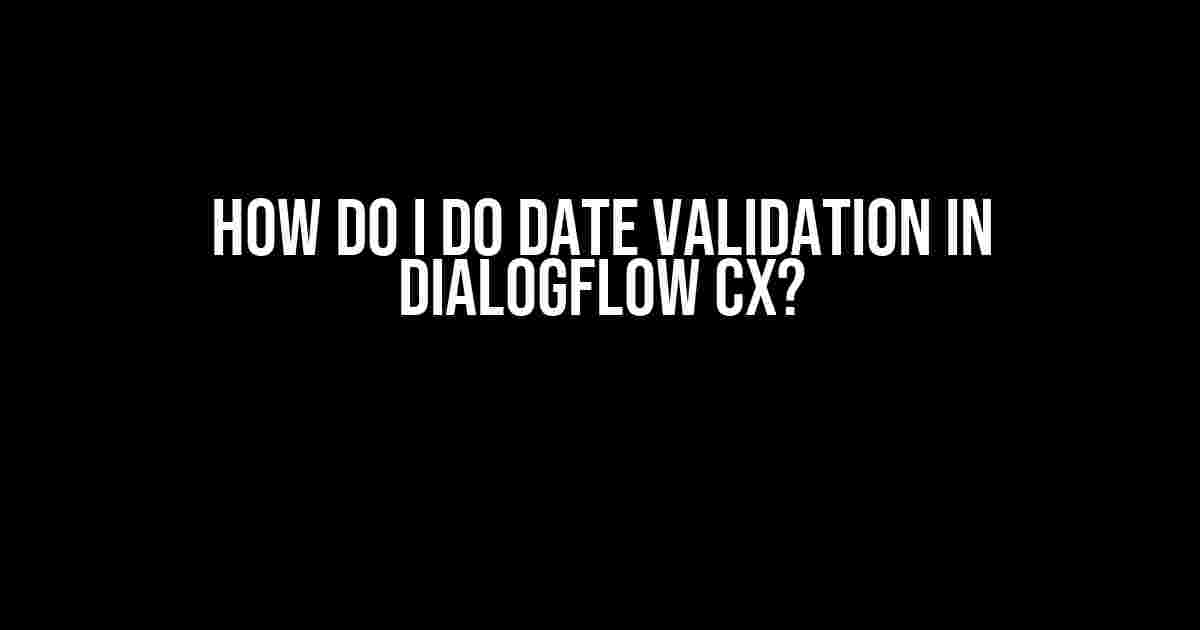Are you tired of dealing with incorrect dates and frustrated users in your DialogFlow CX chatbot? Do you want to ensure that your bot can accurately validate dates and provide a seamless user experience? Look no further! In this article, we’ll take you on a step-by-step journey to master date validation in DialogFlow CX.
Why Date Validation Matters
Date validation is a crucial aspect of any chatbot that deals with dates, appointments, or schedules. It ensures that the user-provided dates are accurate, consistent, and conform to a specific format. Without proper date validation, your bot may encounter errors, leading to frustrated users and a poor overall experience.
The Consequences of Inadequate Date Validation
- Incorrect dates can lead to scheduling conflicts, missed appointments, or delayed responses.
- Inconsistent date formats can cause errors in backend systems, leading to data corruption or loss.
- Frustrated users may abandon your chatbot, resulting in negative reviews and a loss of trust.
Understanding Date Formats in DialogFlow CX
Before we dive into date validation, it’s essential to understand the different date formats that DialogFlow CX supports. The platform recognizes the following formats:
YYYY-MM-DD(e.g., 2023-02-14)MM/DD/YYYY(e.g., 02/14/2023)DD MMM YYYY(e.g., 14 Feb 2023)
Setting Up Date Validation in DialogFlow CX
To set up date validation in DialogFlow CX, follow these steps:
Step 1: Create a New Intent
In your DialogFlow CX console, create a new intent that captures the user’s date input. Name the intent something like “Get Date.”
Step 2: Add a Parameter
Under the intent, add a parameter with the following settings:
| Parameter Name | date |
| Entity Type | @sys.date |
| Required | true |
Step 3: Add a Response
Add a response to the intent that validates the user-provided date. Use the following code:
function validateDate(date) {
const regex = /^(?:\d{4}-(?:0[1-9]|1[0-2])-(?:0[1-9]|[1-2][0-9]|3[0-1])|(?:(?:0[1-9]|1[0-2])\/(?:0[1-9]|[1-2][0-9]|3[0-1])\/\d{4}|(?!0000)(?:\d{4}|\d{2})(?:(?:-)(?:0[1-9]|1[0-2])(?:-)(?:0[1-9]|[1-2][0-9]|3[0-1])?)?)$/;
if (!regex.test(date)) {
throw new Error("Invalid date format. Please enter a date in the format YYYY-MM-DD, MM/DD/YYYY, or DD MMM YYYY.");
}
return date;
}
try {
const date = validateDate($session.params.date);
$session.params.date = date;
// Perform further actions with the validated date
} catch (error) {
$response.error = error.message;
}
Step 4: Test the Intent
Test the intent by providing different date inputs and verifying that the response accurately validates and processes the date.
Advanced Date Validation Techniques
In addition to the basic date validation, you can use advanced techniques to further refine your date validation logic.
Validating Date Ranges
To validate a date range, you can modify the regular expression in the previous example to accommodate the range format:
const regex = /^(?:\d{4}-(?:0[1-9]|1[0-2])-(?:0[1-9]|[1-2][0-9]|3[0-1])\s*-\s*\d{4}-(?:0[1-9]|1[0-2])-(?:0[1-9]|[1-2][0-9]|3[0-1])|(?:(?:0[1-9]|1[0-2])\/(?:0[1-9]|[1-2][0-9]|3[0-1])\/\d{4}\s*-\s*(?:0[1-9]|1[0-2])\/(?:0[1-9]|[1-2][0-9]|3[0-1])\/\d{4}|(?!0000)(?:\d{4}|\d{2})(?:(?:-)(?:0[1-9]|1[0-2])(?:-)(?:0[1-9]|[1-2][0-9]|3[0-1])?)?)(?:\s*-\s*(?:\d{4}-(?:0[1-9]|1[0-2])-(?:0[1-9]|[1-2][0-9]|3[0-1])|(?:(?:0[1-9]|1[0-2])\/(?:0[1-9]|[1-2][0-9]|3[0-1])\/\d{4}|(?!0000)(?:\d{4}|\d{2})(?:(?:-)(?:0[1-9]|1[0-2])(?:-)(?:0[1-9]|[1-2][0-9]|3[0-1])?)?)?)$/;
Validating Recurring Dates
To validate recurring dates, you can use a library like Moment.js to parse and manipulate dates. Here’s an example:
const moment = require('moment');
function validateRecurringDate(date) {
const regex = /^(?:\d{4}-(?:0[1-9]|1[0-2])-(?:0[1-9]|[1-2][0-9]|3[0-1])|(?:(?:0[1-9]|1[0-2])\/(?:0[1-9]|[1-2][0-9]|3[0-1])\/\d{4}|(?!0000)(?:\d{4}|\d{2})(?:(?:-)(?:0[1-9]|1[0-2])(?:-)(?:0[1-9]|[1-2][0-9]|3[0-1])?)?)$/;
if (!regex.test(date)) {
throw new Error("Invalid date format. Please enter a date in the format YYYY-MM-DD, MM/DD/YYYY, or DD MMM YYYY.");
}
const startDate = moment(date, 'YYYY-MM-DD');
if (!startDate.isValid()) {
throw new Error("Invalid start date.");
}
const recurrence =startDate.clone().add(1, 'day'); // Recurrence every 1 day
while (recurrence.isBefore(startDate.clone().add(1, 'year'))) {
console.log(recurrence.format('YYYY-MM-DD'));
recurrence.add(1, 'day');
}
return startDate;
}
try {
const date = validateRecurringDate($session.params.date);
$session.params.date = date;
// Perform further actions with the validated recurring date
} catch (error) {
$response.error = error.message;
}
Conclusion
Date validation is a critical aspect of any chatbot that deals with dates. By following the steps outlined in this article, you can ensure that your DialogFlow CX chatbot accurately validates dates and provides a seamless user experience. Remember to use advanced techniques like date range validation and recurring date validation to further refine your date validation logic.
With a well-implemented date validation system, you can:
- Reduce errors and inconsistencies
- Improve user satisfaction and trust
- Enhance the overall chatbot experience
So, get started today and take your DialogFlow CX chatbot to the next level!
Frequently Asked Question
DialogFlow CX is an incredible tool for building conversational interfaces, but what about validating dates? Don’t worry, we’ve got you covered!
How do I validate a date in DialogFlow CX?
To validate a date in DialogFlow CX, you can use the `format` function in the intent’s response. For example, you can use `format.date)` to check if the user’s input matches the expected date format. You can also use regular expressions to validate dates.
Can I validate dates using Entities in DialogFlow CX?
Yes, you can! DialogFlow CX Entities can be used to validate dates. You can create a custom entity type for dates and define the expected format. Then, in your intent’s response, you can use the `entity` function to extract the date entity and validate it.
How do I handle invalid dates in DialogFlow CX?
When a user enters an invalid date, you can use a fallback intent to handle the error. In the fallback intent, you can respond with a message asking the user to re-enter the date in the correct format. You can also use conditional responses to handle different types of invalid dates.
Can I use external libraries for advanced date validation in DialogFlow CX?
While DialogFlow CX provides built-in date validation functions, you can also use external libraries like Moment.js or Date-fns to handle more complex date validation scenarios. You can integrate these libraries into your DialogFlow CX project using webhook functions or custom business logic.
What are some best practices for date validation in DialogFlow CX?
Some best practices for date validation in DialogFlow CX include using clear and concise error messages, providing examples of valid date formats, and using conditional responses to handle different types of invalid dates. Additionally, make sure to test your date validation logic thoroughly to ensure it handles different scenarios and edge cases.
